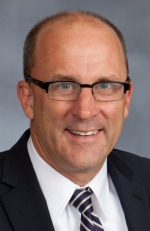
John T. McGreevy // Faculty // Department of History // University ...
(Image by history.nd.edu) Details DMCA
Duluth, Minnesota (OpEdNews) November 7, 2016: My favorite scholar is the American Jesuit polymath Walter J. Ong (1912-2003; Ph.D. in English, Harvard University, 1955). Over the years, I took five courses from him at Saint Louis University (SLU), the Jesuit university in St. Louis, Missouri, that was founded in 1818.
My thesis is that Ong is a deeply original philosopher and theologian, and one of the most original, to have emerged in Western culture thus far, most notably in the following four book-length studies:
(1) Ramus, Method, and the Decay of Dialogue: From the Art of Discourse to the Art of Reason (Harvard University Press, 1958), the main text of his slightly revised Harvard University doctoral dissertation in English about the history of formal logic and rhetoric in Western culture;
(2) The Presence of the Word: Some Prolegomena for Cultural and Religious History (Yale University Press, 1967), the expanded version of Ong's 1964 Terry Lectures at Yale University;
(3) Fighting for Life: Contest, Sexuality, and Consciousness (Cornell University Press, 1981), the published version of Ong's 1979 Messenger Lectures at Cornell University;
(4) Hopkins, the Self, and God (University of Toronto Press, 1986), the published version of Ong's 1981 Alexander Lectures at the University of Toronto.
Before Ong entered the Jesuit order in 1935, he had been educated by Jesuits in high school and college, and he studied philosophy as an undergraduate at Rockhurst College (now Rockhurst University) in Kansas City, Missouri. As part of his lengthy Jesuit training, he did graduate studies in Thomistic philosophy and theology (in Latin) and also earned a Master's in English at SLU, before he later proceeded to Harvard University for his doctoral studies in English.
In general, Jesuits have been and still are exceptionally well educated. But their anti-Jesuit detractors coined the pejorative term "jesuitical" to call attention to their lawyer-like tendency to make fine distinctions.
The Jesuit religious order of men (known formally as the Society of Jesus) was founded in 1540 by St. Ignatius Loyola (1491-1556). Within the Roman Catholic Church, Pope Julius III approved the new religious order in the papal bull Exposcit debitum in 1540 and subsequently confirmed it in the papal bull Regimini militantis Ecclesiae in 1550.
St. Ignatius Loyola is also famous for his compilation of guided meditations known as the Spiritual Exercises of Saint Ignatius, translated by the American Jesuit classicist George E. Ganss (St. Louis: Institute of Jesuit Sources, 1992) and for his Constitutions of the Society of Jesus, also translated by Ganss (St. Louis: Institute of Jesuit Sources, 1970).
Certain early Jesuits became famous as missionaries to distant places including India and China, but other Jesuits stayed in Europe and established Jesuit colleges there. In a comparatively short time, the Jesuits had established so many colleges that they felt that they needed to coordinate their curricular efforts. As a result, they compiled the document in Latin known as the Ratio Studiorum of 1599, translated into English by the American Jesuit classicist Claude Pavur as The Ratio Studiorum : The Official Plan for Jesuit Education (St. Louis: Institute of Jesuit Sources, 2005).
Ong, himself a Renaissance specialist, connects Jesuit education with Renaissance humanism in his 1967 encyclopedia article on "Humanism," which is reprinted in volume four of Ong's Faith and Contexts (Atlanta: Scholars Press, 1999, pages 69-92).
However, despite the ostensible successes of the Jesuits, Pope Clement XIV formally suppressed the Jesuit order in 1773. But later on, Pope Pius VII restored the order in 1814.
In John T. McGreevy's fast-paced and at times vividly written book American Jesuits and the World: How an Embattled Religious Order Made Modern Catholicism Global (Princeton University Press, 2016), the author focuses on the restoration period from 1814 to 1914, but without totally neglecting the rest of the twentieth century and the twenty-first century. As OEN readers know, Donald J. Trump, the Republican Party's 2016 presidential candidate, has difficulty staying on point. But McGreevy has no difficulty staying on point.
Next Page 1 | 2 | 3 | 4 | 5 | 6
(Note: You can view every article as one long page if you sign up as an Advocate Member, or higher).




